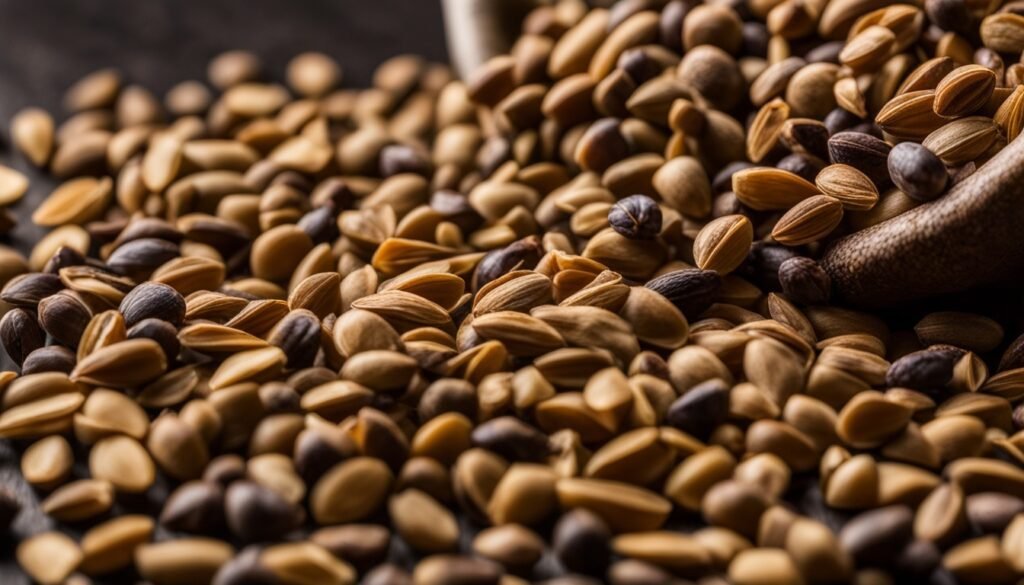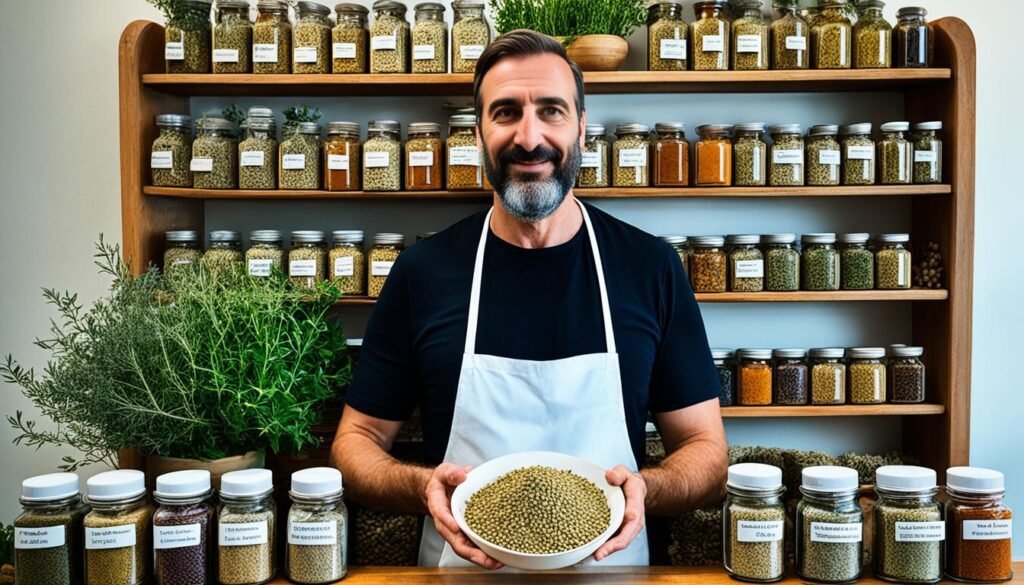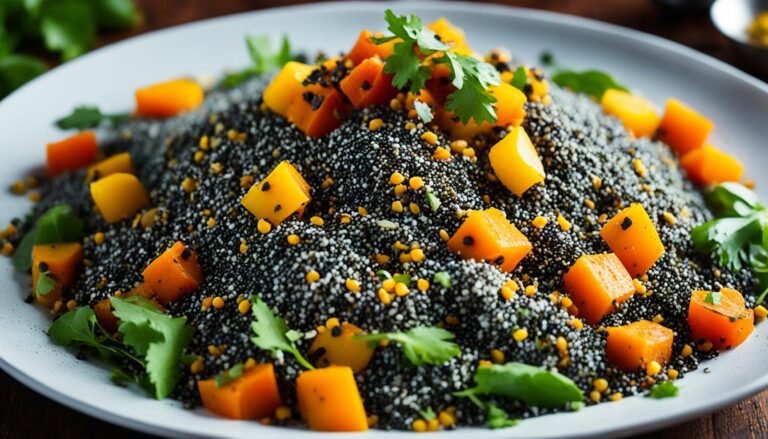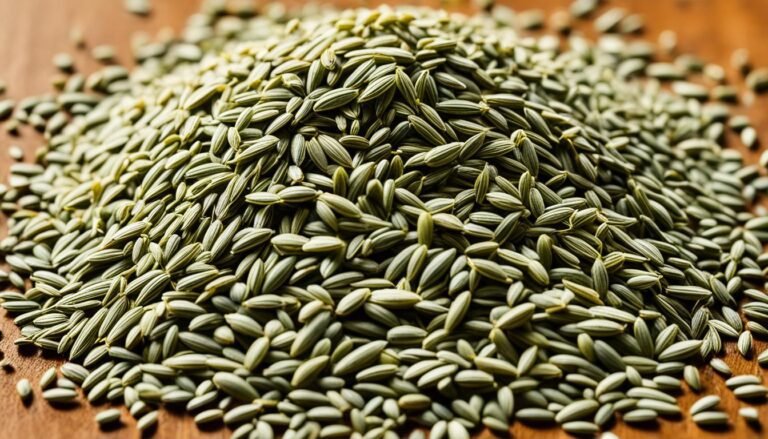Fenugreek Seeds: Benefits and Uses for Health

Just one tablespoon of whole fenugreek seeds is loaded with nutrition. It offers 35 calories, 3 grams of fiber, and 3 grams of protein. Plus, it gives you 21% of the daily iron you need. This herb, also known as Trigonella foenum-graecum, has a history in traditional medicine. It’s valued for its possible health perks.
Fenugreek seeds have several helpful compounds. These include trigonelline, diosgenin, and 4-hydroxyisoleucine. They each play a part in the seed’s effect on our bodies. The seeds are also rich in mucilaginous fiber, galactomannan, and saponin glycosides. These add more nutritional and healing worth.
These seeds might boost how much breastmilk a mother makes. They could help keep blood sugar levels healthy and raise testosterone in men too. In this piece, we’ll look at the many ways fenugreek seeds can improve your health.
What are Fenugreek Seeds?
Fenugreek is an ancient herb known for its uses in traditional medicine. This herb grows about 2-3 feet tall and has green leaves, white flowers, and pods. The pods contain small, golden-brown seeds known as fenugreek seeds. These seeds are often used in Indian cooking for their distinctive flavor and health benefits.
In India, especially in Mumbai, fresh fenugreek leaves are well-loved. Kasuri methi, or dried fenugreek leaves, is essential in making butter chicken. You can also buy frozen fenugreek leaves online to spice up your dishes. These leaves are often added to sauces and quick meals for extra taste.
Before using fenugreek seeds, many people soak them overnight. This helps to reduce their bitter taste. Dried leaves are perfect for seasoning in dishes with oil, yogurt, or cream. Even though fenugreek is great in savory meals, it’s not a good choice for desserts. This advice comes from chefs who have done experiments with it.
Most of the world’s fenugreek is grown in India, mainly in the state of Rajasthan. In terms of nutrition, fenugreek seeds are high in energy and protein. They have lots of dietary fiber, B vitamins, and important minerals like manganese and iron.
“Fenugreek is sometimes used as animal feed, providing green fodder that is palatable to ruminants and also used to feed fish and domestic rabbits.”
The scent and taste of fenugreek comes from a molecule called sotolone. It gives off a sweet smell, similar to maple syrup. This is why fenugreek has a unique aroma and flavor.
Nutrition Facts of Fenugreek Seeds
Fenugreek seeds are packed with nutrients like fiber, protein, carbs, and good fats. With just a tablespoon, you get 35 calories. You also get essential minerals like iron and manganese. These seeds are rich in fiber and special compounds that are good for you.
| Nutrient | Amount per 100g |
|---|---|
| Carbohydrates | 42.3g |
| Protein | 25.4g |
| Fat | 7.9g |
| Fiber | 50.0g |
| Calories | 333kcal |
| Calcium | 160mg |
| Iron | 6.5mg |
| Magnesium | 190mg |
| Potassium | 530mg |
Fiber is a star in fenugreek seeds for sure. It’s full of both soluble and insoluble fiber. You’ll also find plenty of protein in these seeds. Plus, they have a nice mix of carbs and fiber.
Fenugreek seeds are good for you partly because of their fats, like oleic and linolenic. These fats have health benefits too.

Fenugreek seeds are a great choice for a well-rounded diet. But remember, too much of a good thing can be bad. Talk to a doctor before eating a lot, especially if you have health issues.
Effects on Breastmilk Production
Fenugreek, a herb we often use in cooking and medicine, might help moms make more milk. It can be especially good for newborns to grow well. Many studies have checked how useful fenugreek is for moms who are nursing their babies.
In 2013, a big review in the Journal of Human Lactation found that herbs, like fenugreek, can make more milk. A study in 2020, seen in the Cochrane Database, also said this.
Fenugreek and Breastmilk Volume
Drinking fenugreek tea or taking supplements could mean more milk for moms. Lots of research shows this is true:
- A study in 2012, from the journal Hayat, found that talking on the phone about using fenugreek helped new moms breastfeed better.
- Work from the International Journal of Pediatrics in 2020 showed fenugreek helps nursing moms feed their babies well.
- Also, a study in 2018 from the Journal of Medicinal Plants found fenugreek herbal tea helped Sineh-zani, a sign of enough milk, in baby girls in Iran.
- In 2020, Clinical Epidemiology and Global Health talked about how fenugreek helps make more milk and babies gain weight during the first week.
If moms eat fenugreek, it might be a good natural way to make more milk.
Considerations for Fenugreek and Breastfeeding
Fenugreek is usually safe, but some moms might not react well to it. They might gain weight or have tummy issues. It’s smart to talk to an expert before using fenugreek or any supplement while nursing.
“Fenugreek consumption can help boost breastmilk production in women experiencing a decrease in supply due to factors like stress or fatigue.”
If you think fenugreek might help, do your research and follow the directions. With good advice, fenugreek can be a great help in your nursing journey.
Effects on Testosterone Levels in Men
Fenugreek is a herb known for both cooking and medicine. Recently, it’s getting noticed for potentially helping men’s health. Some studies show it might boost testosterone and improve men’s sexual function.
Fenugreek and Testosterone Boosting
Studies looked at how fenugreek affects testosterone in men. One found that taking 300 milligrams twice a day for 8 weeks helped. This, combined with working out, raised testosterone levels. It also cut body fat but not muscle.
In another study, a group of men took a supplement with 600 mg of fenugreek, plus minerals and vitamin B6. Many reported better sex drive and function. This hints that fenugreek could be good for men’s health.
So far, it seems fenugreek could naturally support testosterone and sex drive. But, we need more studies to know exactly how it works.

“Some studies suggest that fenugreek supplements may increase breast milk production significantly in four out of five studies examined.”
Low testosterone might affect 39% of men over 45. Fenugreek, when part of a healthy lifestyle, could help. This includes regular exercise, a good diet, and managing stress.
| Study | Findings |
|---|---|
| 12-week study with 50 men | Daily intake of a 500-mg fenugreek supplement containing protodioscin resulted in up to a 46% increase in testosterone levels in 90% of the participants. |
| 12-week study with 120 men aged 43-75 | Those consuming 600 mg of fenugreek seed extract daily experienced increases in testosterone levels and improved libido compared to a control group. |
May Help Control Diabetes and Blood Sugar Levels
Fenugreek is an old herb many are looking at for diabetes and blood sugar. Studies show fenugreek helps with type 2 diabetes treatment.
Fenugreek and Diabetes: Promising Findings
A study showed using 5 grams of fenugreek seed powder twice a day for two months helped a lot. People saw their fasting blood sugar, belly fat, BMI, and A1c levels decrease.
Using fenugreek flour in baked goods might make insulin work better in type 2 diabetes. Fenugreek’s high fiber could improve how our bodies handle sugar in those without diabetes.
“A small 2009 study found that a daily dose of 10 grams of fenugreek seeds soaked in hot water may help control type 2 diabetes.”
Even though the data looks good, the NIH says it’s not strong enough yet. They warn that fenugreek isn’t FDA-approved, and making supplements isn’t always safe.
The Potential Mechanisms
Experts think fenugreek’s fiber and impact on insulin are key. The fiber slows down how fast we absorb sugar. This keeps blood sugar from spiking.
There’s also a thought that fenugreek might boost how well insulin works. This could be another way it helps control blood sugar.
Still, we need more in-depth studies to grasp how fenugreek really helps. Always talk to your doctor before adding any supplement to your diabetes care.
fenugreek seeds and Their Potential Health Benefits
Fenugreek is not just for boosting breastmilk and testosterone, or controlling blood sugar. It might also help with other health issues. This spice may support heart health, aid in lowering cholesterol, help with less heartburn, and decrease inflammation.
Appetite Control and Weight Management
Some research shows fenugreek helps with feeling full and eating less. This is due to its high fiber. It has a compound that blocks fat, which can help maintain weight and keep metabolism healthy.
Cholesterol-Lowering Properties
Fenugreek might be good for your heart by lowering bad cholesterol and raising good. This is because of the saponins and fiber it has. It could be a natural way to improve heart health.
Relief from Heartburn
There’s early evidence that fenugreek might ease heartburn. It’s thought that certain compounds in it make a soothing layer in the stomach. More research is needed to be sure how effective it is.
Anti-Inflammatory Benefits
Fenugreek is full of antioxidants that can fight inflammation. Studies show it may help with conditions related to inflammation. It could be helpful for various health issues.
Though promising, the full benefits of fenugreek are not yet fully known. It seems like a multipurpose supplement, but always talk to a doctor before adding it to your routine.
How to Use Fenugreek Seeds
Fenugreek is an herb with many uses. It is found in supplements, teas, and as a spice. The right amount of fenugreek to use depends on why you are taking it and how it is prepared.
Fenugreek Supplement Dosage
Studies show different doses of fenugreek for different effects. For men wanting to boost testosterone and improve sex, 250 to 600 mg daily is common. For women trying to increase breastmilk, 1 to 6 grams work well. Research on lowering cholesterol and blood sugar used 5 to 25 grams.
Always check the label for how much to take. And it’s smart to talk to your doctor. The right dose changes person to person and with the goal in mind.
Using Fenugreek Seeds
Here are some ways to use fenugreek seeds:
- Make tea by steeping 1 teaspoon of seeds in hot water for 5-10 minutes.
- Grind them into powder for using in recipes like garam masala.
- Soak seeds in water overnight to lessen the bitter taste. Then, use in cooking.
- Roast the seeds for a richer, nutty taste.
- Use a mesh strainer to remove the seeds from your tea for a smoother drink.
Adding fenugreek seeds to your daily routine can help improve your health. This can be through supplements or cooking with them.

Safety and Side Effects
Fenugreek is usually safe, but it’s good to know the risks. This herb can cause certain side effects. We’ll learn about these side effects and the best ways to stay safe.
Potential Side Effects of Fenugreek
Most people might face some stomach issues with fenugreek. These include diarrhea, upset stomach, and bloating. Remember, these problems are more likely if you take a lot of fenugreek.
Sometimes, fenugreek can lead to a drop in blood sugar. This is more common if you’re already taking medicine for diabetes. Also, severe allergic reactions have happened in a few cases.
Always talk to your doctor before trying fenugreek. This is especially true if you have health problems or take other medicines. Your doctor can help you use fenugreek safely and lower the risk of side effects.
Fenugreek Safety Considerations
- It’s best for pregnant women to avoid fenugreek. It has things that can start early labor and might harm the baby.
- If you have cancers that grow because of estrogen, be careful with fenugreek. It works a bit like estrogen and could make your condition worse.
- Fenugreek might not mix well with blood-thinners like warfarin. Always check with a doctor before taking it with other medicines or supplements.
If fenugreek gives you bad or lasting side effects, stop using it and see a doctor. You can also tell the FDA in the U.S. by calling 1-800-FDA-1088, or in Canada, by calling 1-866-234-2345.

Start slowly with fenugreek to see how your body reacts. Knowing about the risks and being careful lets you enjoy fenugreek safely. It can still be a good addition to your health routine.
The Role of Fenugreek in Traditional Medicine
Fenugreek comes from a long line of use in traditional medicine. It’s especially popular in India and China. They’ve used it for thousands of years to help with many health issues. This plant is not only a tasty spice and a thickener in cooking but is also known for its likely health perks.
Fenugreek in Ayurvedic Medicine
In Ayurveda, from India, fenugreek holds high value. Known as methi there, it’s praised for boosting breast milk in new moms. They consider it a great help for women who are nursing. It’s not just for milk, though. Fenugreek is a go-to for skin, belly upsets, and diabetes.
Fenugreek in Chinese Medicine
The Chinese, too, have used fenugreek for a very long time. They call it hu lu ba. It’s part of their healing tradition. There, it’s used to help with breathing troubles, painful joints, and blood flow problems. Often, they mix fenugreek seeds with other plants to make special healing blends.
Both Indian and Chinese healing traditions value fenugreek highly. Its past use as a healing plant is encouraging today’s scientists. They’re learning more about fenugreek’s potential health perks.

“Fenugreek has been used for thousands of years in various cultures for its nutritive properties and health benefits.”
Potential Risks and Precautions
Fenugreek is mostly safe, but some need to be careful. Pregnant women should not use it. It might cause the uterus to contract and lead to birth defects. It’s best to avoid fenugreek and pregnancy.
If you have cancers that react to hormones, be cautious with fenugreek too. It might act like estrogen in your body. Always talk to your doctor before adding fenugreek to your health routine, especially if you have other health issues.
Potential Risks of Fenugreek
- Uterine contractions and increased risk of birth abnormalities in pregnant women
- Potential estrogenic effects that may impact hormone-sensitive cancers
- Interactions with diabetes medications and other supplements that lower blood sugar levels
- Mild side effects like diarrhea and indigestion
Even though fenugreek risks are not high, learning about them is important. Always check with a doctor first if you have health problems.
| Potential Risk | Explanation |
|---|---|
| Pregnancy Complications | Fenugreek contains compounds that can stimulate uterine contractions, increasing the risk of preterm labor and birth defects. |
| Hormone-Sensitive Cancers | Fenugreek may have estrogenic effects that could potentially impact the progression of certain types of hormone-sensitive cancers. |
| Blood Sugar Interactions | Fenugreek may interact with diabetes medications and other supplements that lower blood sugar levels, potentially causing hypoglycemia. |
| Digestive Side Effects | Fenugreek may cause mild side effects like diarrhea and indigestion in some individuals. |
In the end, fenugreek can be good for health. But, it’s key to use it carefully. Pregnant women and those with certain cancers should be extra careful. Always talk to a doctor before using fenugreek. This helps keep you safe and healthy.
Conclusion
Fenugreek is a powerful herb used in traditional medicine for centuries. It has shown promise in various studies for improving health. Benefits include better breastmilk production, higher testosterone in men, and controlling blood sugar. It also might help with changing your appetite, lowering cholesterol, and fighting inflammation. Yet, we need more research to know all its possible uses and effects for sure.
Fenugreek is usually safe for most people. But, it can be risky for pregnant women and those with hormone-related cancers. Always talk to a doctor before adding it to your routine. This is especially important if you’re already dealing with health issues or taking certain drugs.
The bottom line is, fenugreek seems to have plenty of health pluses. But, it’s wise to be careful. Understand both the good and the not-so-good sides. That way, you can choose what’s best for your health wisely.
FAQ
What are fenugreek seeds?
Fenugreek is an herb that grows to about 2–3 feet tall. It has green leaves and small white flowers. Inside its pods are small, golden-brown seeds. These seeds are popular in Indian cooking for their sweet, nutty flavor and health benefits.
What are the nutrition facts of fenugreek seeds?
One tablespoon of fenugreek seeds, which weighs about 11 grams, provides 35 calories. These seeds also pack fiber, protein, carbs, fat, and important minerals like iron and manganese.
Can fenugreek help increase breastmilk production?
Some studies suggest fenugreek may boost milk supply in nursing mothers. Drinking tea or taking supplements with fenugreek can help increase the amount of breast milk produced.
Can fenugreek boost testosterone levels in men?
Early findings indicate fenugreek might raise testosterone in men. Men who took supplements saw an increase in their levels, helping with libido and other sexual functions.
Can fenugreek help control diabetes and blood sugar levels?
Research shows fenugreek’s potential to lower blood sugar levels. It may help manage type 2 diabetes by reducing fasting blood sugar, belly fat, and the A1c.
What other potential health benefits does fenugreek have?
There are hints that fenugreek could help with controlling appetite, improving cholesterol, and fighting heartburn. It’s also said to help with inflammation and a variety of other health conditions. Yet, more studies are needed to support these benefits.
How should fenugreek seeds be used?
You can find fenugreek in supplement form. The right dosage varies, depending on what it’s used for. Studies have used anywhere from 250 mg to 25 g, depending on the need.
Are there any safety concerns with fenugreek?
For most people, fenugreek is safe. But, some might experience mild side effects like diarrhea. If you take medications for diabetes, or other blood sugar-lowering supplements, be careful with fenugreek.
What is the role of fenugreek in traditional medicine?
For many centuries, fenugreek has been a part of traditional and Chinese medicine. It was used to treat skin problems, diseases, and also as a spice and thickening agent at home.
Are there any potential risks or precautions with fenugreek?
Women who are pregnant should stay away from fenugreek. It contains compounds that can lead to contractions and may harm a baby. Those with hormone-sensitive cancers should also avoid it.







4 Comments